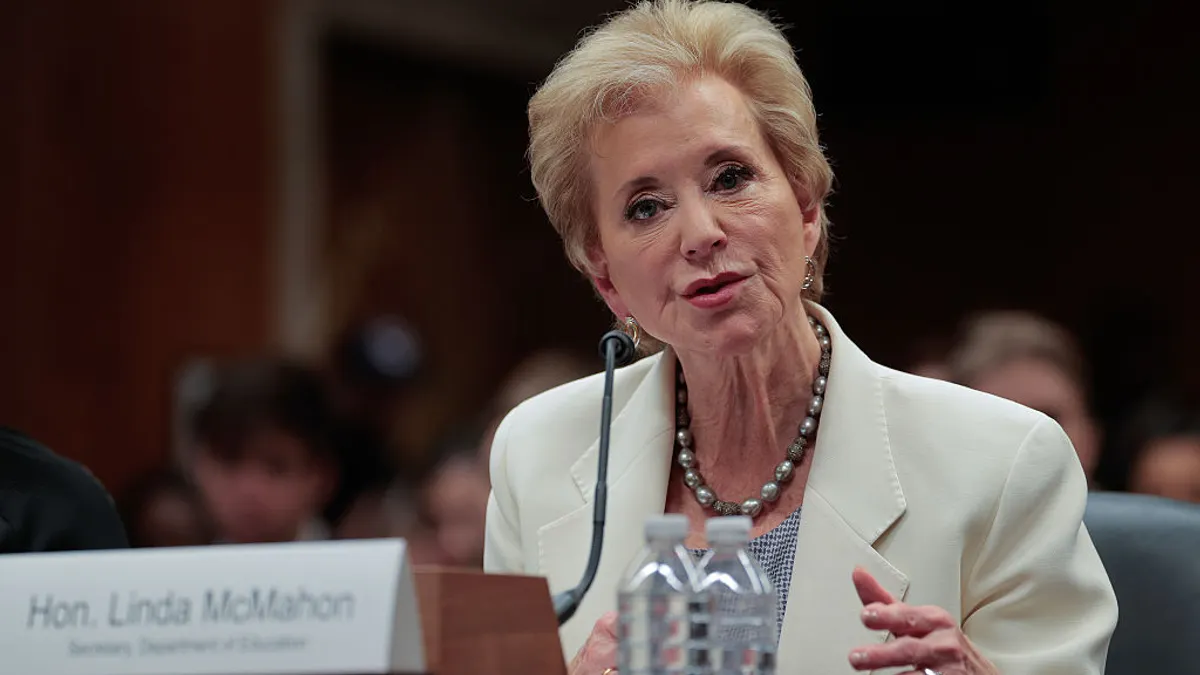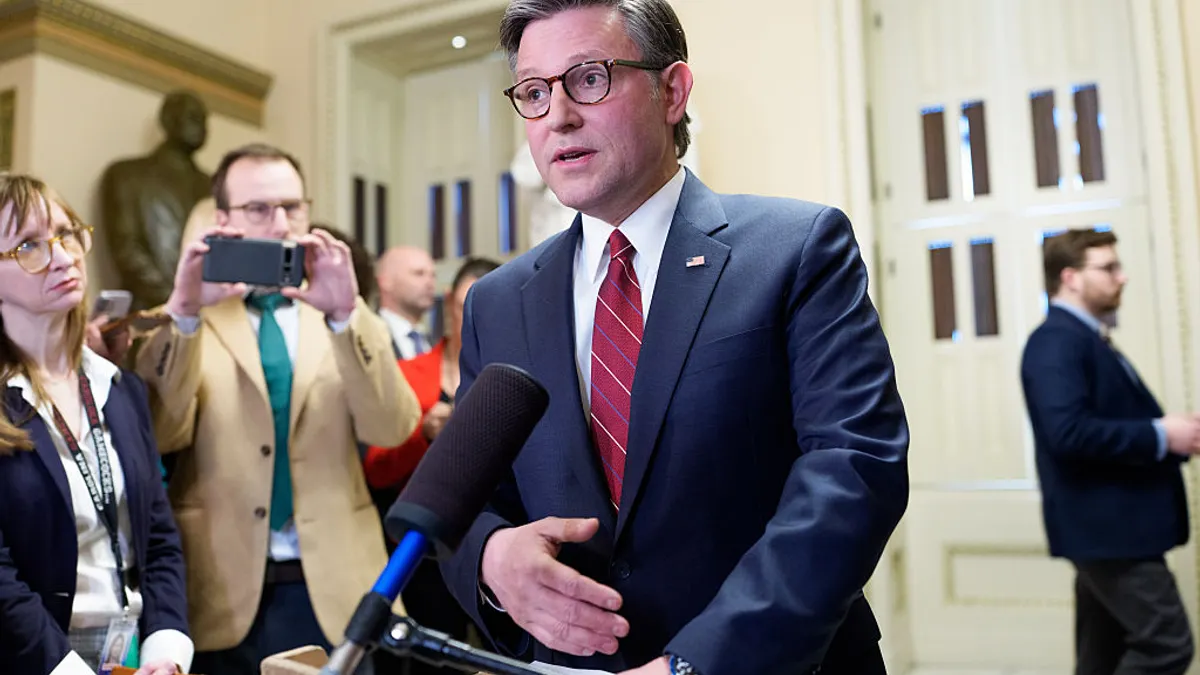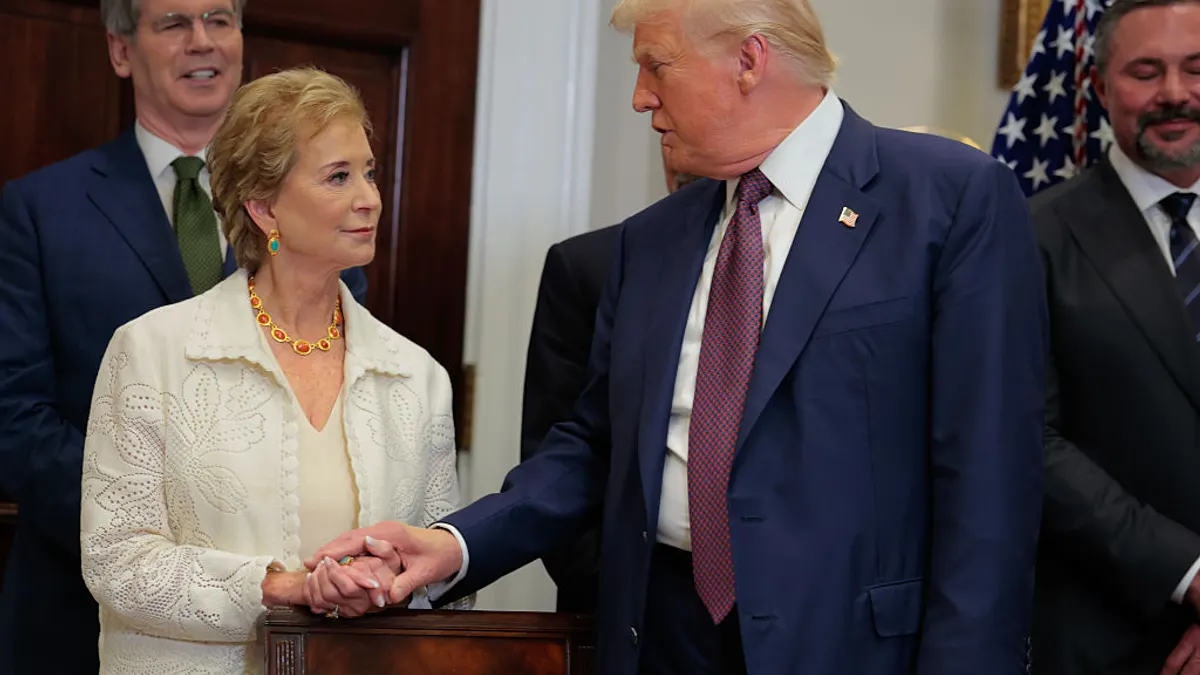U.S. Education Secretary Linda McMahon testified before the Senate Appropriation Committee’s education subcommittee Tuesday, defending the Trump administration’s budget plan for fiscal 2026 that would dramatically reduce federal education spending.
The president's proposal includes a 15.3% reduction to the U.S. Department of Education, including by lowering the maximum Pell Grant by nearly a quarter to $5,710 per year and cutting a supplemental federal aid program for low-income students.
McMahon said the budget plan would reduce bureaucracy and take “a significant step” toward the Trump administration’s stated goal of dismantling the Education Department and giving states more control over education.
While some of the Republicans on the panel praised the Trump administration’s initiatives, including the proposed increase in federal funding for charter schools, many lawmakers raised concerns about the budget’s vast reductions.
Below are three takeaways about how congressional lawmakers reacted during the hearing to the budget plan’s higher education provisions.
Staunch defense for TRIO and Gear Up
Democratic and Republican senators alike urged McMahon to preserve federal funding for the TRIO and Gear Up programs, both of which aim to help disadvantaged students attend and graduate college.
However, McMahon defended the Trump administration’s request to end all $1.6 billion in federal funding that go toward TRIO and Gear Up grants.
“I just think that we aren't able to see the effectiveness across the board that we would normally look to see with our federal spending,” McMahon said.
McMahon also argued that the Education Department doesn’t have enough oversight over the TRIO.
“These programs were negotiated at very tough terms,” McMahon said. “The Department of Education has no ability to go in and look at the accountability of TRIO programs.”
She suggested that the Trump administration work with lawmakers to audit TRIO and “attach accountabilities” to it if lawmakers continue funding it.
However, Sen. Jeff Merkley, a Democrat from Oregon, pushed back against McMahon’s assertion that the program lacked accountability, pointing to a recent report from the Pell Institute. The higher education research organization, in part, summarized reports commissioned by the Education Department to study the TRIO program.
One 2015 evaluation found that learners in TRIO’s Student Support Services Program were 78% more likely to complete an associate degree or credential, or transfer to a four-year college, after entering a two-year institution than those who didn’t participate, according to a 2024 report from the Pell Institute. Similarly, TRIO students who entered a four-year institution were 23% more likely to graduate with a bachelor’s degree.
“Let me just say your argument that there's no studies, no accountability, it's just actually wrong,” Merkley said.
‘Unprecedented steps to extort schools and universities’
Democratic lawmakers took issue with the Trump administration’s fight with Harvard University and other high-profile colleges, arguing that federal officials were attempting to exert unprecedented influence on both classroom instruction and their daily operations.
“You claim the administration's goal of eliminating the department is about returning education to the states,” said Sen. Tammy Baldwin, a Democrat from Wisconsin. “At the same time, this administration is attempting to exert more control than ever over the decisions in our schools and campuses.”
Sen. Patty Murray, a Democrat from Washington, also pushed back against the Trump administration’s assertion that its budget would give states more control over education.
“The reality is this administration is actually taking unprecedented steps to extort schools and universities and hold federal funding hostage if they don't conform with your agenda,” Murray said. “It's pretty clear that returning education to the states actually means letting states and colleges and local communities pick up the tab.”
The Trump administration has threatened vast swathes of federal funding for both colleges and K-12 schools. That includes freezing or nixing over $2.6 billion of Harvard’s federal grants or contracts after the Ivy League institution refused to yield the Trump administration’s demands to make changes to academics, admissions and hiring.
Sen. Chris Murphy, a Democrat from Connecticut, pushed back on the demands the Trump administration issued to Harvard, which included an audit of the viewpoint diversity of both students and faculty.
“What statute gives you the right to tell any university that they have to have a certain mixture of viewpoints?” Murphy said.
The Education Department and other federal agencies claim that Harvard has violated civil rights law by not doing enough to protect Jewish students from harassment. Harvard President Alan Garber indicated in April that the university needed to do more to address the campus climate following twin reports on bias against Jewish, Israeli, Muslim, Arab and Palestinian students and employees..
McMahon on Tuesday said both Garber and Columbia University’s president have indicated they need to do more to address antisemitism. She also said civil rights violations are what led the Trump administration to pull funding from Harvard.
“That was kind of the crux of what brought us into talking to the different universities,” McMahon said. “And then we sat down with them to say, ‘Okay, these are other issues that you need to address on your campus, because you do receive federal funding.’”
In late March, Columbia agreed to a list of demands it received from the Trump administration.
Concerns over OCR funding
Both Democratic and Republican lawmakers voiced concerns about the Education Department’s deep cuts to the Office for Civil Rights, which investigates harassment and discrimination at colleges and K-12 schools. That includes Sen. Shelley Moore Capito, a Republican from West Virginia, who asked McMahon how the Education Department would work to prevent antisemitism on college campuses.
“Our Office [for] Civil Rights has opened many cases looking at antisemitism, and we are actively enforcing that,” McMahon replied, citing the Trump administration’s suspension of federal funding to Harvard and $400 million to Columbia University over claims neither institution has done enough to protect Jewish students from harassment.
“We’re saying we mean business,” McMahon added.
The Trump administration has also proposed a 35% cut to the office for fiscal year 2026. The Education Department has also cut hundreds of OCR staffers and shuttered seven of 12 regional offices during its mass layoffs earlier this year, though a federal judge recently ordered the agency to reinstate fired employees.
“You're one person,” Capito said. “You need the support and the backup of that office to be able to investigate these cases.”
McMahon also gave insight into OCR’s case backlog. She said the Education Department inherited 20,000 cases from the Biden administration, a number that is now down to about 2,500.
“One of the things that we found is some of those cases were like one-page complaints, and we've really been able to get rid of many of them,” McMahon said.
In response, Murray asked McMahon if the Education Department would provide quarterly reports on OCR’s caseload so they can determine whether the office is “simply dismissing these cases or doing its job.”
McMahon agreed to the reports, adding, “I can assure you it’s doing its job.”























